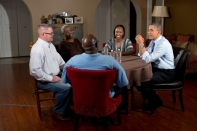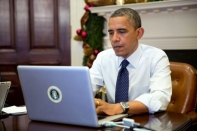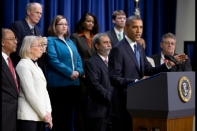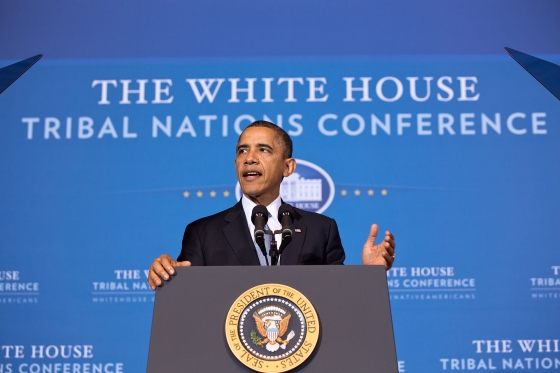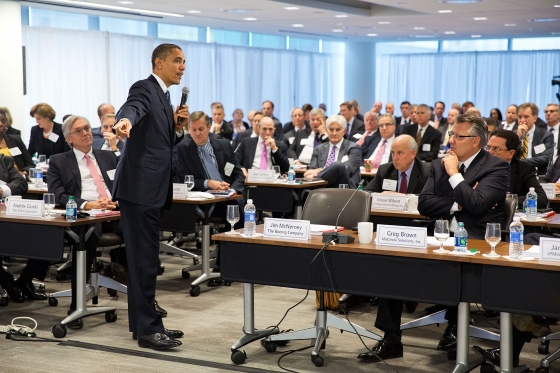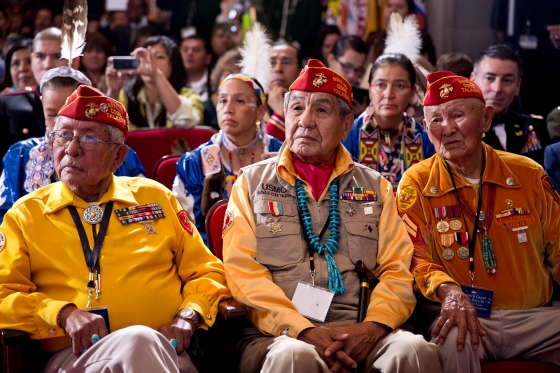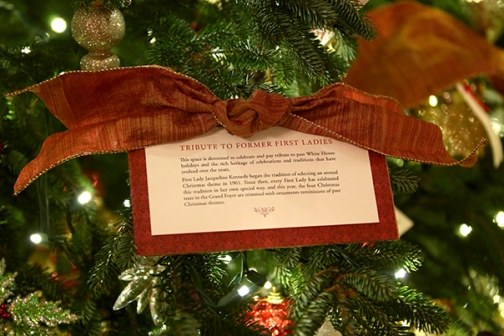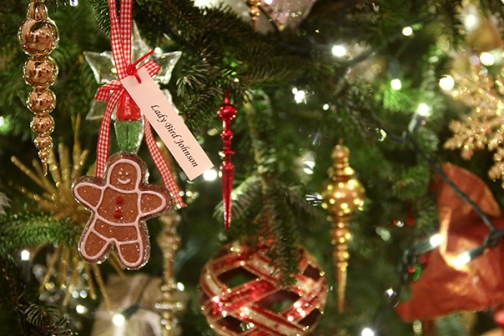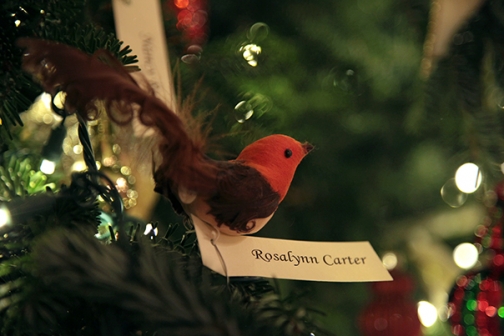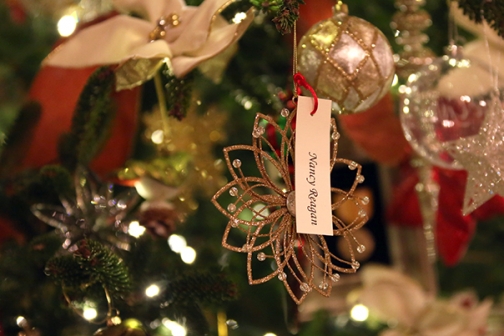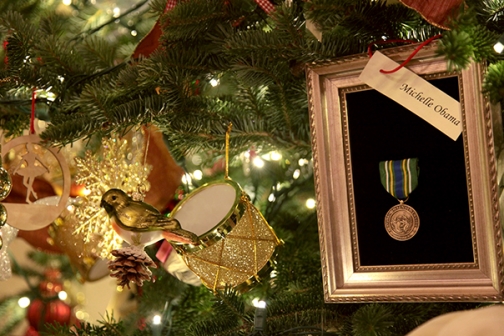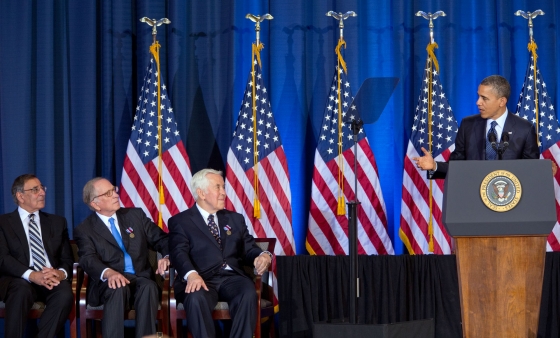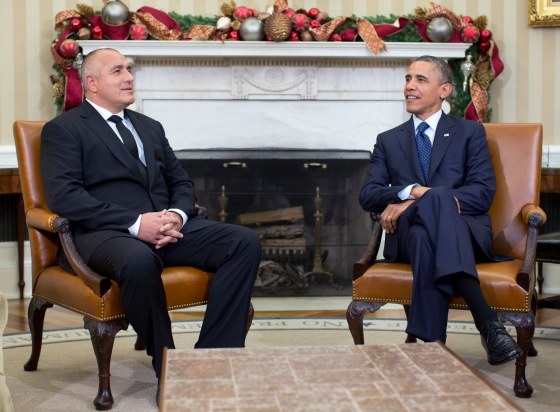-
Welcome to the West Wing Week, your guide to everything that's happening at 1600 Pennsylvania Ave. This week, the President visited a toy factory, hosted Kennedy Center Honorees, held the 2012 White House Tribal Nations Conference, welcomed the Prime Minister of Bulgaria, answered questions live on twitter, spoke on National Security achievements, visited a family who had written the White House, and lit the National Christmas Tree. That's November 30th to December 6th or "I Have to Pinch Myself."
Friday, November 30th:
- On Friday, the President visited Hatfield Pennsylvania, to tour The Rodon Group manufacturing facility, a third-generation family business that depends on middle class consumers during the holiday season. They produce toys like Tinkertoy, K’NEX and Angry Bird Building Sets. There the President stressed the need for congress to act now and extend the middle-class tax cuts to help businesses, like Rodon, who depend on families having some shopping money this holiday season.
- Back at the White House, Senior Advisor, Valerie Jarrett, and Senior Director of the National Security Council, Gayle Smith, held White House Office Hours on twitter answering questions on the administration's efforts in the global fight against HIV/AIDS.
Saturday, December 1st:- A commemorative red ribbon was displayed on the north portico of the White House to commemorate World AIDS Day.
Sunday, December 2nd:- The President and the First Lady hosted legendary entertainers at the White House for the Kennedy Center Honors Reception. The President recognized their extraordinary talents and emphasized the importance of the arts in our nation's culture.
- West Wing Week caught up with Led Zeppelin lead guitarist and Honoree Jimmy Page.
Monday, December 3rd:- The President took questions via twitter, about the need to extend the Middle Class Tax cuts.
- The President met with the Prime Minister of Bulgaria.
- The President then went to the National Defense University to speak to the Nunn-Lugar Cooperative Threat Reduction Symposium.
Tuesday, December 4th:- The president sat down with Bloomberg television in the map room to discuss tax cuts for the middle class.
- The President also dropped by The National Black Caucus of State Legislators in the Roosevelt Room.
Wednesday, December 5th:- The President made a short trip down Pennsylvania Ave to The Business Roundtable where he addressed a room full of the CEO's from major business institutions on his plan for a balanced approach to meaningful tax reforms.
- Later, the President addressed the 2012 White House Tribal Nations Conference at the Department of Interior.
Thursday, December 6th:- The President then visited the Santana family in Falls Church, VA. Tiffany Santana wrote the white house through the site WhiteHouse.Gov/my2k to share how a $2,000 tax hike on the middle class would effect her family. The President sat down with the Santana's to highlight just one of the millions of middle-class families who would have to make great sacrifices if congress cant work together to extend middle-class tax cuts by the end of the year.
- Later That evening, the President and First Family attended the National Christmas Tree Lighting ceremony.
-
Today President Obama visited one of the 114 million American families who would see their taxes go up next year if Congress fails to extend the middle-class tax cuts.
Tiffany, a high school teacher who lives in Northern Virginia, is also one of the thousands of people who wrote in to the White House to share what it would mean to her family if their income taxes went up next year.
Although a typical middle-class family could pay about $2,000 more in taxes in 2013 if the tax cuts aren't extended, the President explained why Tiffany’s family would likely pay more.
Her husband, Richard, works at a Toyota dealership. They actually live with Tiffany’s parents, both of whom are still working. And so what Tiffany pointed out was that an increase of $2,000 or so for her and her husband in this household would actually mean $4,000 that was lost. And a couple of thousand dollars means a couple months’ rent for this family.
-
As the debate over the so-called "fiscal cliff" in Washington continues, much of the conversation centers on deficit reduction, revenues, and tax rates. But what is easily lost in that conversation is the very real meaning this has for families all across America. The fact is Hispanic-American families just can't afford tax increases right now, but that's what will happen if Congress fails to act. In fact the median Hispanic family of four would see their income taxes rise by $2,200. An astounding 99 percent of Hispanic families will be affected.
President Obama is committed to growing our economy from the middle out by ensuring a strong, secure, and thriving middle-class, and is proposing a balanced approach. There is no reason to hold middle-class families hostage while we debate tax cuts for millionaires and billionaires. Below you'll find a link to a fact sheet that shows how Hispanic families will be affected. We're also asking all of you to tell us what $2,000 means to your family's budget. Take a look at our #My2K page, and tell us on twitter what that money means to you.
And download the fact sheet on the Fiscal Cliff and Hispanic-American families here.
-
Tonight, President Obama and the rest of the First Family will take part in a ceremony to light the National Christmas Tree, and you're invited to watch it live.
The event, which takes place on the Ellipse -- just outside the White House -- will be hosted by Neil Patrick Harris and feature performances by, James Taylor, The Fray, Jason Mraz, and other musical guests.
What: Lighting of the National Christmas Tree
When: 4:30 ET, today
Where: Streamed live online at: thenationaltree.orgThe lighting of the National Christmas tree is a great way to get into the holiday spirit. Be sure to check it out!
-
There’s one thing in Washington that everyone agrees on: income taxes should not increase on middle class families.
Middle class families are the heart and soul of America, and the driving force behind our economy. And today, the middle class lies at the center of the debate in Washington about jobs, taxes, and the deficit. If Congress does not act by year’s end, the typical middle class family of four will see their income taxes increase by over $2,000 - which means that much less money in a family budget for groceries for dinner, gas in the car or a holiday gift for a loved one.
Republicans, Democrats and Independents agree that the middle class should not see their income taxes rise. Yet, some Members of Congress are insisting that we hold up tax cuts for 98 percent of families in order to protect the top 2 percent of income earners in America.
Today, the White House National Economic Council released
astate-by-state reports about the real-life impact of these tax increases on America’s middle class families if Congress fails to act by January 1. Not only will families across the country see an increase in federal income taxes, but families stand to lose out on expansions to the Child Tax Credit and the Earned Income Tax Credit. In addition, millions of families will no longer get help paying for college from the American Opportunity Tax Credit, which provides up to $10,000 over four years to help families afford college.Take this example for a typical family of four living in Texas:
A typical median-income Texas family of four: a married couple with two children earning
$65,900 would see a $2,200 tax increase.
- A tax increase of $1,000 because the Child Tax Credit will fall from $1,000 to $500 per child.
- A tax increase of $890 because of merging the 10 percent tax bracket into the 15 percent tax bracket.
- A tax increase of $310 because of the expiration of marriage penalty relief that provides a larger standard deduction for married couples.
Total Tax Increase on this Family if Congress Fails to Act = $2,200
-
Last week, President Obama called on Americans to speak out about what a $2,000 tax hike next year would mean for them and their families – and thousands of people from around the country are doing just that.
We’ve heard from more than 370,000 people in all 50 states, and many say that paying $2,000 more in taxes would force families to make some tough choices about their household budgets. For some, it might mean deciding whether to buy groceries or fill a prescription. For others, it would be the difference in making rent or paying tuition.
Tiffany, who lives in Northern Virginia with her husband, six-year old son, and parents, is one of the many people who wrote in. The “picture of the 21st middle class,” her family decided on their multi-generation blended living situation to save money and spend more time together.
But with two sets of working adults – a teacher and an auto industry worker, and a child-care provider and postal worker –Tiffany said that her household would be doubly affected by a tax hike. And as a family of budding entrepreneurs, they would have less money to get their new businesses off the ground.
Today, President Obama will meet Tiffany and her family in their home, to talk more about why it’s so important for Congress to pass the middle-class tax cuts before the end of the year, both for families like hers and our economy.
-
December 06, 2012
10:51 AM ESTThe 2012 White House Holiday card has arrived. And this year's card spotlights the beloved First Family's dog, Bo.
The card was designed by Larassa Kabel, a professional artist from Des Moines, Iowa. Ms. Kabel has been creating photorealistic prints, paintings and drawings for the past 8 years and was featured as a solo artist in the Des Moines Art Center's Iowa Artist Show in 2009, the Iowa Artist 2010 group show and many other solo and group shows in Iowa, Michigan, Texas, Florida and New York. Her work is in several private and corporate collections including Aviva, Wellmark Blue Cross Blue Shield, and the World Food Prize headquarters. She also has a much-loved dog at home, which is why she chose to feature Bo in this year’s White House Holiday card.
To learn more:
-
Each year, President Obama hosts a White House Tribal Nations Conference here in Washington, DC. The goal is to give leaders from America's federally-recognized tribes the opportunity to interact directly with members of the Obama administration, including the President.
And while yesterday, administration officials, including eight Cabinet members, discussed programs and initiatives that affect Native American communities, President Obama began his remarks with a more personal message.
He used the event to remember Sonny Black Eagle -- the Crow National tribal leader who adopted the President in 2008. Black Eagle passed away in his sleep last month. He was 78.
The President celebrated what he called Sonny Black Eagle's "remarkable life."
-
Today, President Obama spoke to members of the Business Roundtable, an association of CEOs of American businesses, and reiterated his plan to extend tax cuts for middle-class families.
He explained how preventing tax hikes for middle-class families is good for business leaders as well as the broader economy.
“If the companies in this room are doing well, then small businesses and medium-sized businesses up and down the chain are doing well," he said. "If companies in this room are doing well, then folks get jobs, consumers get confidence, and we're going to be able to compete around the world.”
-
From the Roosevelt Room of the White House Monday, President Obama connected directly with Americans via Twitter, where he answered questions about extending middle class tax cuts (watch the video here).
Good to see lots of folks on twitter speaking out on extending middle class tax cuts. I'll answer some Qs on that at 2ET. Ask w/ #My2k –bo
— The White House (@whitehouse) December 3, 2012
During the live Twitter Q&A, the President addressed the need for a balanced approach to reduce the deficit, the ongoing fiscal cliff negotiations, and even weighed in with his predictions for Chicago sports teams from the White House Twitter account. During the conversation, the hashtag #My2k was used more than 31,000 times and trended nationally on Twitter throughout the chat.
-
December 05, 2012
10:53 AM ESTOver the past four years, through tribal consultation and the White House Tribal Nations Conferences, President Obama and his Administration have worked to ensure that tribal leaders are directly involved in setting policy priorities. Today, President Obama is hosting the 2012 White House Tribal Nations Conference at the Department of Interior.
This conference continues to build upon the President’s commitment to strengthen the government to government relationship with Indian Country, by providing invited leaders from the 566 federally recognized tribes the opportunity to interact directly with the President and representatives from the highest levels of his Administration. In conjunction with today’s event, the White House released a report, “Continuing the Progress in Tribal Communities,” that examines the President’s agenda and how this Administration, by working together with tribes, has made a difference for American Indians and Alaska Natives.
-
Say a friend stops by and asks to borrow a screwdriver.
You say sure. When she returns the screwdriver a couple days later, your friend mentions that she made an improvement: now it works with both Phillips and flat head screws. Another friend hears this and asks if he can take a look, too. When he returns the screwdriver, it's been upgraded again: now it's a power screwdriver. Then a third friend gets excited and adds some extra speeds and a better battery.
This situation sounds improbable, but it's how open source software development takes place.
On open source projects, programmers build tools to solve specific problems, then make those tools freely available so others can use them and contribute their own improvements. The communities of programmers that grow up around successful open source projects often produce tools that are more secure, flexible, and cost-effective than those produced by a team working in isolation.
The key is building a community.
That's why I'm pleased to announce that we've established an official White House presence on Drupal.org, an online community dedicated to maintaining and improving Drupal, the software that powers WhiteHouse.gov. We've released the source code for several Drupal modules in the past and we're now working with members of the Drupal community who are helping us improve We the People, the White House petitions system. In the coming months, we hope to release a new, "white label" theme for We the People that will make it easier for others to re-use the code and set up their own petitions systems.
-
If Congress fails to act before the end of the year, every family in the country will see their income taxes automatically go up at the beginning of 2013.
A typical middle class family of four will see their income taxes rise by $2,200. We can’t let that happen. Our families can’t afford it, and neither can our economy.
The thing is, you don’t have to be an economist or economic expert to understand why that’s the case.
-
December 04, 2012
11:53 AM ESTOn December 5, 2012, President Obama will host representatives invited from each of the 566 federally recognized American Indian tribes, and Alaska Native Villages, at the 2012 White House Tribal Nations Conference. Fulfilling a commitment to improve and expand dialog with Indian Country, the President has hosted a Tribal Nations Conference in each year of his Presidency to facilitate a lasting discussion between Tribal Leaders and Senior Administration Officials. The opening and closing sessions of the Conference will be available for live online viewing at www.WhiteHouse.gov/Live and also at www.DOI.gov/Live. The expected agenda is as follows:
Opening Session, 9:00am – 10:30am EST
Secretary Ken Salazar, Department of the Interior
Secretary Arne Duncan, Department of Education
Deputy Secretary Neal Wolin, Department of the Treasury
Acting Secretary Rebecca Blank, Department of Commerce
Secretary Kathleen Sebelius, Department of Health and Human Services
Secretary Tom Vilsack, Department of AgricultureClosing Session, 1:30pm – 3:30pm EST
Leaders of Each Tribal Leaders Breakout Session
Secretary Ray LaHood, Department of Transportation
Secretary Hilda Solis, Department of Labor
President Barack ObamaThe White House Tribal Nations Conference is the cornerstone of the Administration’s outreach and engagement with tribal governments and the dialogue and lessons learned will help shape federal policy in the weeks, months and years to come. We would like to sincerely thank all tribal leaders who will be taking part in the White House Tribal Nations Conference and we look forward to our continued collaboration and dialogue.
-
December 04, 2012
11:16 AM ESTIn 1961, First Lady Jacqueline Kennedy started the White House tradition of selecting an official holiday theme. For her daughter Caroline, Mrs. Kennedy created a Nutcracker-themed Christmas at the White House—and the tradition has lived on ever since. This year, the White House celebrates and pays tribute to past White House holidays with four unique trees in the Grand Foyer. Each tree is decorated with a collection of ornaments that best represent the holiday legacies of former First Ladies dating back more than 50 years to Mrs. Kennedy, and in the gallery above you can see some of the ornaments chosen to highlight past holidays.
First Lady Michelle Obama continues the tradition with this year’s theme “Joy to All.”
It celebrates the many joys of the holiday season: the joy of giving and service to others; the joy of sharing our blessing with one another; and of course, the joy of welcoming our friends and families as guests into our home over the next several weeks.
-
President Obama is committed to growing our economy from the middle out by ensuring a strong, secure, and thriving middle-class. Now we face a deadline that requires action on jobs, taxes and deficits by the end of the year. While the President is committed to working with Congress to reduce our deficit in a balanced and responsible way, there is no reason to hold the middle-class families hostage while we debate tax cuts for the highest income earners.
To see what the impact would be on consumers and retailers in your community if Congress does not extend the tax cuts for the middle class, click on the link below for your state.
-
On Monday, President Obama traveled to the National Defense University to mark the 20th anniversary of what he called "one of the country’s smartest and most successful national security programs" -- the Nunn-Lugar Cooperative Threat Reduction Program for the destruction of weapons of mass destruction in the former Soviet Union.
And after celebrating some of the accomplishments of that program, the President discussed the need to continue that nonproliferation work in the decades ahead.
"We simply cannot allow the 21st century to be darkened by the worst weapons of the 20th century," he said. "And that’s why, over the past four years, we’ve continued to make critical investments in our threat reduction programs -— not just at DOD, but at Energy and at State. In fact, we’ve been increasing funding, and sustaining it. And even as we make some very tough fiscal choices, we’re going to keep investing in these programs —- because our national security depends on it."
President Obama also delivered a specific message to Syrian President Bashar al-Assad.
"On Syria, let me just say this. We will continue to support the legitimate aspirations of the Syrian people -— engaging with the opposition, providing with -- providing them with the humanitarian aid, and working for a transition to a Syria that’s free of the Assad regime," the President said. "And today, I want to make it absolutely clear to Assad and those under his command: The world is watching. The use of chemical weapons is and would be totally unacceptable. And if you make the tragic mistake of using these weapons, there where be consequences, and you will be held accountable."
President Obama concluded his remarks by telling the story of a trip he took to the Ukraine with Senator Richard Lugar when both men were in the Senate.
"We went to a facility, an old factory," he said. "We walked down these long, dark corridors. Finally, we came across some women, sitting at a worktable. On it were piles of old artillery shells. And the women were sitting there, taking them apart. By hand. Slowly. Carefully. One by one."
"It took decades -— and extraordinary sums of money -- to build those arsenals," President Obama told the audience today. "It’s going to take decades -- and continued investments --to dismantle them."
-
Today, President Obama met with Bulgarian Prime Minister Boyko Borissov.
The President thanked Prime Minister Borissov for Bulgaria’s strong partnership in NATO, as well as the country’s support in Afghanistan and its cooperation on criminal investigations, law enforcement, and counterterrorism.
“But of course, the relationship is not just based on security issues,” President Obama said.
Bulgaria is a modernizing country, and I know that the Prime Minister is interested in a range of reforms to create an open and transparent government, to improve trade and commerce between our two countries, as a leader in the Balkans in moving towards further integration with Europe and the rest of the world economy. We've been very impressed with the progress that's been made in Bulgaria, and I'm looking forward to hearing from the Prime Minister how the United States can further assist in those efforts.
-
If Congress doesn’t act, a typical middle-class family will see their taxes go up by about $2,000. Last week, President Obama began calling on Americans to make their voices heard and share what $2,000 means to families across the country.
And today, the President connected directly with the Americans who are speaking out about these tax cuts. During a live Twitter Q&A from the Roosevelt Room of the White House, President Obama explained why Congress must act and encouraged people around the country to continue to add their voices to the debate.
-
In the past week, more than 300,000 people have spoken up about the importance of extending the middle-class tax cuts. More than 100,000 stories have been sent in to the White House website alone, and they continue to make for powerful reading.
Here's another round of stories from Americans from all over the country that were too good for us not to share:
Nan, California -- I'm a single mom with a daughter in high school. As a nurse, I make a good income, and I've been saving to help my daughter afford a college education. I can't add to savings for college and pay an additional $2000. in taxes."
Nathan, Oklahoma -- It means helping our four kids have what they need for school and paying the extra medical and dental bills that crop up annually. This is a huge amount for a family our size on our incomes.
Christopher, Tennessee -- Being a father of 2 supporting a middle class family, $2000 is a huge amount of money. It would help pay for our children's medical bills and help to build a savings for their future.
Virginia, Texas -- $2000 means prescriptions for my multiple sclerosis and my husband's high blood pressure. It means tuition for the boy we're putting through college.
Pamela, New York -- Money to help my 70 yr old mother cover her medical and daily expenses.
Sonya, Nevada -- $2,000 will allow me to give more to charities that have a greater need because there is still far too many people are hurting.
Jared, Michigan -- It means about 3 months of childcare for my son.
Shania, North Carolina -- $2,000 is my mortgage payment + Water bill + Gas bill + Electric bill + Gas for the car + life insurance payment for 1 month.
Julie, Ohio -- $2,000 is 3 months of rent. I need this.
Joshua, Maine -- A tax increase of $2,000 would mean that I would need to find an additional job.
Learn more
Watch all the musical acts







